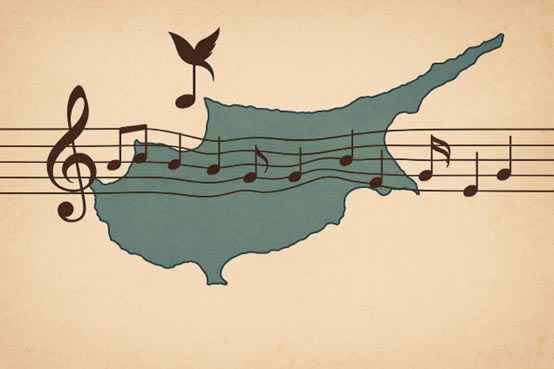By Flora Alexandrou
Music, a universal language that crosses every border, has long shaped how people face conflicts and differences. From ancient ceremonies to modern protests, its rhythms have carried anger, hope and defiance, giving voice to what words cannot. Its power lies in bypassing logic and speaking directly to feeling, reaching places diplomacy cannot.
And last Sunday in Cyprus, that power was felt. After years of inertia in the Cyprus talks, something unexpected stirred in the north. Through the ballot box, Turkish Cypriots bid a humiliating farewell to Tatar, sang their defiance against Ankara’s oppression, and welcomed Erhurman.
Crowds poured into the streets to celebrate with a Cypriot folk song, Tillyrkotissa. A melody both sides of the island know by heart echoed through the streets like a bridge disguised as a tune. Rooted in the island’s shared soil and sung for generations by both Greek and Turkish Cypriots, it drifted through the night air. Playful and filled with the endearing nonsense syllables of Korakistika – a secret code formed by inserting invented sounds into ordinary speech (vereve, varava, vuruvus) – it suddenly carried a meaning far beyond its lyrics: a shared rhythm, the oldest form of coexistence.
Of course, not every note in this victory was sung for peace. Many Turkish Cypriots voted out of sheer exhaustion – with inflation, corruption scandals, unemployment, and Ankara’s heavy hand pressing down on daily life. Their vote was as much a protest against domestic decay as it was a gesture of hope. Yet in Cyprus, everyday life is never simply domestic. Nothing escapes the island’s division; it shapes the economy, the institutions and daily life itself.
So Erhurman, a long-time supporter of a federal solution, became the north’s maestro of a divided orchestra. That night his supporters set the tone, striking a federal rhythm still waiting for accompaniment.
Meanwhile, south of the buffer zone, the orchestra is still tuning. Here too, some are content with the comfort of the status quo, while others dream of a unitary state that cannot return. Some prefer to play solo, rejecting any form of solution. Yet there are still those who believe in coexistence, singing alongside their compatriots and hoping others will join in.
Music, however, is never merely a pastime in conflict zones. It is memory set to rhythm. It reminds people of who they were before slogans replaced songs. It can awaken empathy, rebuild trust and allow emotions to travel where politics fears to tread.
But even the most beautiful melody cannot end an occupation or rewrite a constitution. For Tillyrkotissa to become more than background music, the entire choir must join in – not only Greek and Turkish Cypriots – but also the guarantor powers that keep humming their own tunes. And yes, that includes Turkey, which may need to finally let go of its monotonous two-state refrain.
Peace is usually expected to come from diplomacy, but what if it actually begins with something simpler: a shared human connection, a rhythm that makes people dance before they argue? If both sides can keep this melody alive without flags or fear, perhaps we will finally manage to play in the same key.
Until then, the orchestra waits, the microphones buzz, and somewhere in Tylliria a woman sings, smiling into the wind: “Leveve-va startevi-va againvi-va, sofuva-viri, togeve-vuru…” (Let’s start again, anew, together.)






Click here to change your cookie preferences